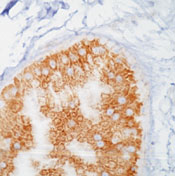Phosphotyrosine Mouse Monoclonal Antibody [Clone ID: PY20]
CAT#: AM00199PU-N
Phosphotyrosine mouse monoclonal antibody, clone PY20, Purified
Need it in bulk or conjugated?
Get a free quote
CNY 7,912.00
货期*
4周
规格
Specifications
| Product Data | |
| Clone Name | PY20 |
| Applications | ELISA, IF, IHC, IP, WB |
| Recommend Dilution | ELISA: 100 ng/ml. Immunofluorescence. Western blotting: 2 µg/ml. For the detection of phosphoproteins, tyrosine phosphatase inhibitors such as 1mM Sodium Orthovanadate should be added to the sample buffer. Milk or other casein-based blocking solutions are not recommended as casein is a phosphoprotein and its use can result in high background. Immmunoprecipitation: Use Protein A and Ab at 2 µg/mg protein lysate. Immunohistochemistry on Paraffin Embedded Sections: 5-10 µg/ml 30 min RT. Staining of formalin-fixed tissues REQUIRES boiling tissue sections in 10mM citrate buffer, pH 6.0, for 10-20 minuntes followed by cooling at RT for 20 minutes. |
| Reactivity | All Species |
| Host | Mouse |
| Clonality | Monoclonal |
| Specificity | PY20 recognises Phosphotyrosine, enabling the detection, characterisation and isolation of proteins containing phosphorylated tyrosine residues. The binding of PY20 to phosphorylated Tyrosines can be inhibited by free Phosphotyrosine and Phenylphosphate, but not by free Phosphate, Phosphoserine or Phosphothreonine. |
| Formulation | Borate buffered saline pH 8.0 State: Purified State: Liquid purified IgG fraction Preservative: 0.09% Sodium Azide |
| Concentration | lot specific |
| Purification | Affinity Chromatography |
| Conjugation | Unconjugated |
| Storage Condition | Store the antibody undiluted at 2-8°C for one month or (in aliquots) at -20°C for longer. Avoid repeated freezing and thawing. |
| Background | The phosphorylation of tyrosine acts as a important signal in the control of cell mitogenesis, differentiation, proliferation, and migration and occurs following the activation of intracellular tyrosine kinases, including the T-cell receptor (TCR), epidermal growth factor (EGF) and many families of receptor and non-receptor protein tyrosine kinases (PTKs), which catalyse the transfer of ATP to a tyrosine residue on specific cell protein targets. |
| Reference Data | |
Documents
| Product Manuals |
| FAQs |
| SDS |
Resources
| 抗体相关资料 |
Customer
Reviews
Loading...


 United States
United States
 Germany
Germany
 Japan
Japan
 United Kingdom
United Kingdom
 China
China

